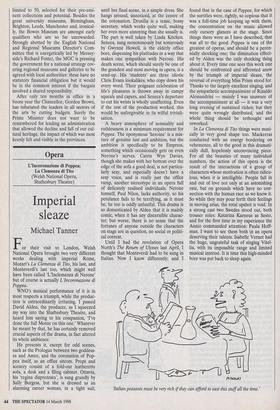Opera
Imperial sleaze
Michael Tanner
For their visit to London, Welsh National Opera brought two very different works dealing with imperial Rome, Mozart's La Clemenza di Tito, his last, and Monteverdi's last too, which might well have been called `L'Inclemenza di Nerone' but of course is actually L'Incoronazione di Poppea.
WNO's musical performance of it is in most respects a triumph, while the produc- tion is extraordinarily irritating. I passed David Alden, the producer, as I squeezed my way into the Shaftesbury Theatre, and heard him saying to his companion, 'I've done the full Monte on this one.' Whatever he meant by that, he has certainly removed crucial aspects of the drama, in fact altered its whole ambience.
He presents it, except for odd scenes, such as the Prologue between two goddess- es and Amor, and the coronation of Pop- pea itself, as an office sitcom. Props and scenery consist of a fold-out leatherette sofa, a desk and a filing cabinet. Ottavia, his `regina disprezzata', is sung grandly by Sally Burgess, but she is dressed as an alarming career woman, in a tight suit, until her final scene, in a simple dress. She hangs around, unnoticed, at the centre of the coronation. Drusilla is a tense, bossy secretary, which works quite well, making her even more annoying than she usually is. The part is well taken by Linda Kitchen. Seneca, sung monotonously but sonorously by Gwynne Howell, is the elderly office bore, dispensing his platitudes in a way that makes one sympathise with Nerone. His death scene, which should surely be one of the grandest and most moving in opera, is a send-up. His 'students' are three idiotic Chris Evans lookalikes, who copy down his every word. Their poignant celebration of life's pleasures is thrown away in campy squeals and capers, and Seneca's departure to cut his wrists is wholly unaffecting. Even if the rest of the production worked, this would be unforgivable in its wilful triviali- sation.
A heavy atmosphere of sensuality and ruthlessness is a minimum requirement for Poppea. The eponymous 'heroine' is a mix- ture of genuine lust and ambition, but the ambition is specifically to be Empress, something which occasionally gets on even Nerone's nerves. Catrin Wyn Davies, though she makes with her bottom over the edge of the sofa a good deal, is not particu- larly sexy, and especially doesn't have a sexy voice, and is really just the office vamp, another stereotype in an opera full of delicately realised individuals. Nerone himself, Paul Nilon, lacks authority, so his petulance fails to be terrifying, as it must be; he too is oddly unlustful. This drama is so domesticated by Alden that it is mainly comic, when it has any discernible charac- ter; but worse, there is no sense that the fortunes of anyone outside the characters on stage are in question, no social or politi- cal context.
Until I had the revelation of Opera North's The Return of Ulysses last April, I thought that Monteverdi had to be sung in Italian. Now I know differently; and I found that in the case of Poppea, for which the surtitles were, rightly, so copious that it was a full-time job keeping up with them, the concentration on the music allowed only cursory glances at the stage. Since things there were as I have described, that was all to the good. Poppea is one of the greatest of operas, and should be a peren- nially shocking one; the diminution effect- ed by Alden was the only shocking thing about it. Every time one sees this work one should be confronted and affronted anew by the triumph of imperial sleaze, the reversal of everything Miss Prism stood for. Thanks to the largely excellent singing, and the sympathetic accompaniment of Rinaldo Alessandrini — mainly I was unaware of the accompaniment at all — it was a very long evening of sustained riches; but they were quite wrongly distributed, and the whole thing should be rethought and reworked.
In La Clemenza di Tito things were musi- cally in very good shape too. Mackerras conducted with an energy bordering on vehemence, all to the good in this dramati- cally dull, hopelessly unconvincing piece. For all the beauties of many individual numbers, the action of this opera is the result of the interactions of a group of characters whose motivation is often ridicu- lous, when it is intelligible. People fall in and out of love not only at an astonishing rate, but on grounds which have no con- nection with the human race as we know it, So while they may pour forth their feelings in moving arias, the total upshot is void. In a strong cast two Swedes stood out, both trouser roles: Katarina Karneus as Sesto, and for the first time in my experience the Annio commanded attention: Paula Hoff- man. I want to see them both in an opera deserving their talents. Isabelle Vernet had the huge, ungrateful task of singing Vitel- lia, with its impossible range and limited musical interest. It is time this high-minded bore was put back to sleep again.
'Italian peasants must be very rich if they can afford to east this stuff all the time.'


































































 Previous page
Previous page